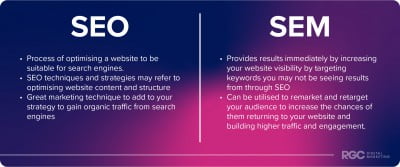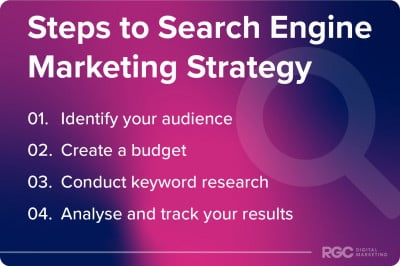Fundamentals of Search Engine Marketing

Table of Contents
- What is Search Engine Marketing?
- Why is Search Engine Marketing important?
- SEM vs SEO - What You Need To Know
- Steps to Building a Search Engine Marketing Strategy
- Identify your audience
- Create a budget
- Conduct keyword research
- Analyse and track your results
- SEM Tips to Consider
- Implement Search Engine Marketing
Are you looking to ensure your business is recognised online? Do you want to reach your audience to experience an increase in brand awareness and recognition? Search engine marketing is a beneficial strategy to add to your digital marketing strategy to see the growth and results for your business.

What is Search Engine Marketing?
Search engine marketing (SEM) refers to paid advertising which assists in the visibility of a website or products in search engine result pages (SERPs). When your business produces results in search engine result pages, this builds brand recognition and engagement which benefits the growth and results your business will see.
There are many factors to consider when beginning to implement search engine marketing which may include having a solid understanding of all of your top competitors, an effective advertising campaign, a developed strategy behind your advertising campaigns and utilising your search engine optimisation (SEO) strategy to understand which keywords you should be targeted to bring in results.
Why is Search Engine Marketing important?
Since you can target specific keywords, it is a great way to target potential customers. This means that you are paying for clicks for people who are already interested in the products and services your brand offers.
Search engine marketing allows you to track and analyse your results closely to identify what aspects are working and if any changes are required to see the results you are striving for. You may wish to utilise a site such as Google Analytics, which allows you to see which advertisements are successful through the data collected and you are able to adjust your budget based on your findings.
When people search for your targeted keywords and specific terms, SEM allows your website to be more visible and rank higher on search engines. This will lead to higher user engagement and growth for your business with continuous rankings. SEM has been shown to be effective in business growth and traffic as well as ROI. According to the latest stats, businesses that use search engine marketing can see an average return of $3 for every $1 spent.
SEM vs SEO – What You Need To Know
Many people tend to get confused between the aspects which relate to SEO and the aspects which relate to SEM. it is important to understand the differences between both and how they can both provide results for your business.
Search engine optimisation (SEO) is the process of optimising a website to be suitable for search engines. SEO techniques and strategies may refer to optimising website content and structure, utilising on-page SEO elements of metadata, or implementing off-page SEO techniques. SEO is a great marketing technique to add to your strategy to gain organic traffic from search engines, although it may take a bit of time before you begin to see results.
SEM provides results immediately by increasing your website visibility by targeting keywords you may not be seeing results from through SEO. SEM can be utilised to remarket and retarget your audience to increase the chances of them returning to your website and building higher traffic and engagement. SEO and SEM are both beneficial techniques to add to your digital marketing strategy to reach your business objectives and see an increase in website traffic and engagement.

Steps to Building a Search Engine Marketing Strategy
A search engine marketing strategy should be tailored towards your business and your specific goals. There are many factors you may wish to consider when building your SEM strategy, although it is important, to begin with, the fundamentals of a strategy and you may wish to develop your strategy from there.
Identify your audience
When identifying your target audience and the group you are targeting with your SEM campaign, it is important to understand who your ideal customer and audience are and their demographics and geographics. Understanding these aspects of your audience will assist you with deciding on which keywords to target based on your audience and their buying behaviours.
Create a budget
A search engine marketing campaign may cost you a significant amount of money if you do not have a pre-planned budget in place. It is important to consider realistic goals when setting your budget to ensure your goals are achievable and able to be met long-term.
Conduct keyword research
It is essential to conduct keyword research to determine which keywords you should be targeting within your SEM campaign which are relevant to your business and most beneficial for your audience. The keywords you choose will target your ads and optimise your website for search engines to rank your business effectively.
Analyse and track your results
Tracking and analysing your campaign results is essential to determine the success of your SEM campaign and understand what is working and areas that may need to be improved and altered. It may be beneficial to track conversions, clicks, website visitors and any other relevant key metrics.

SEM Tips to Consider
When implementing your SEM strategy and campaign, it is important to align your strategy with your entire digital marketing strategy to ensure you are aiming for the best goals and objectives. You may wish to think about how SEM fits in with your overall marketing strategy, rather than thinking of the two as separate entities. Some top tips to consider when implementing your SEM strategy include:
- Focusing on your long-term goals rather than honing in on only your short-term goals.
- Align your SEM strategy with your overall business strategy and goals whether that is to enhance conversions or secure long-term customers.
- Specify your audience based on your needs. If you are looking to target your audience in a specific area, you may wish to narrow down your geo-targeting to reach them.
- Consider your keyword intent. Understanding why your audience is searching for specific keywords or search terms is essential for understanding your target audience.
- Create engaging content to ensure your audience is interested in your campaign and will continue to engage with your content and website.
Implement Search Engine Marketing
If you are looking to increase your website’s traffic and visibility whilst generating more leads and growing your business, a search engine marketing strategy and a campaign is a great option. Search engine marketing effectively reaches your target audience to boost your online presence in the evolving digital world.


